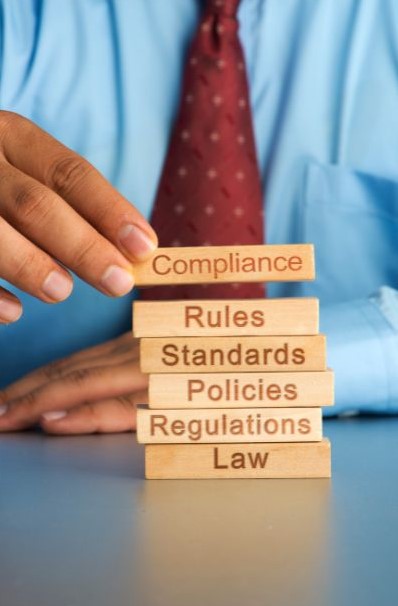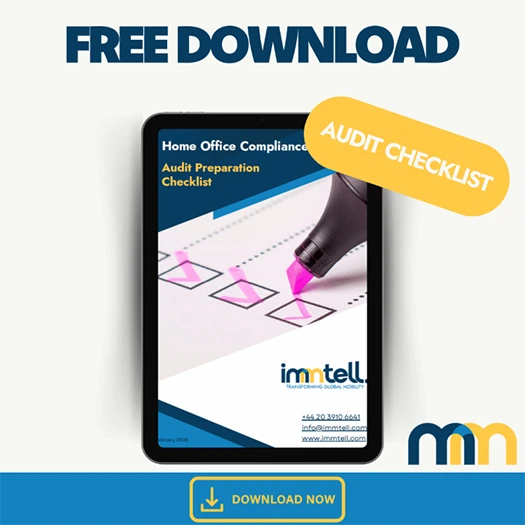7 Common Sponsor Duties HR Teams Miss
What HR and Ops Teams Often Miss: Key Home Office Sponsor Duties Highlighted by Our Mock Audits

Your Home Office sponsor licence is only as strong as your ability to meet the ongoing responsibilities that come with it. These sponsor duties are not just “best practice”, they are legally binding conditions that apply to your business as long as your licence is live.
We work with HR, compliance, and operational leads across all sectors. Whether the business is scaling quickly or has held a licence for years, we frequently see the same areas of risk, usually because internal teams don’t realise what’s required.
Based on real audit findings and mock immigration compliance audits we carried out in 2024 and 2025, here are seven sponsor duties that HR and operations teams most commonly miss.
1. Failing to Report Changes in a Sponsored Worker’s Role
If a sponsored worker changes duties, job title, working hours, or salary, this may need to be reported to the Home Office, or could even require a new Certificate of Sponsorship (CoS) and visa application.
Common triggers for reporting:
- Changes that alter the original occupation code
- Material changes to job responsibilities
- Pay changes that fall below the applicable salary threshold
- Reduction in working hours below minimum permitted limits
Why it matters:
The worker must continue to meet the visa rules linked to their CoS. Unreported changes can lead to compliance findings, even if the change seems minor internally.
2. Not Monitoring Visa Expiry Dates Internally
Relying solely on your sponsored workers or the Sponsor Management System (SMS) to track expiry dates is risky.
You should have:
- A dedicated internal visa monitoring process
- Automated alerts for expiry dates and renewals
- Reminders tied into your HR calendar at least 3–6 months in advance
Risk:
If a renewal is missed or a new CoS is issued too late, the worker could lose the right to work, and your business could be in breach of sponsor duties.

3. Inconsistent or Non-Compliant Right to Work Checks
Right to work checks are a legal requirement for all employees, and the Home Office has significantly increased civil penalties for breaches (up to £60,000 per illegal worker).
Common issues:
- Incomplete records (e.g. no date or signature)
- Screenshots stored incorrectly or not at all
- Failure to repeat checks when visas are time-limited
- No internal training for new starters handling onboarding
Sponsor-specific risk:
Failing to carry out proper checks can directly affect your sponsor licence rating—even if the issue doesn’t involve a sponsored worker.
4. Not Keeping Records Required Under Appendix D
Appendix D of the immigration rules outlines the documents you must keep for every sponsored worker. These include:
- ID documents and visa evidence
- Job descriptions and signed contracts
- Recruitment records (CVs, interview notes, adverts)
- Absence tracking and annual leave logs
- Evidence of payment (payslips, bank transfers)
Issue:
Many businesses lack a consistent file structure or checklist, leading to gaps that are only discovered during audits.
Fix:
Create a digital sponsor file for each worker and audit these every 6–12 months.
5. Overlooking Absence Monitoring and Reporting
You must be able to show that all sponsored workers are:
- Regularly attending work
- Paid in line with their CoS
- Not exceeding unauthorised absences
You are required to report any:
- Unauthorised absence of 10 consecutive working days
- Prolonged absences due to illness, study, or travel (in some cases)
Risk:
Failure to track and report absences can be interpreted as losing contact with the worker, leading to enforcement action or revocation.
6. Missing the 10 Working Day Reporting Deadline
Sponsor duties include timely reporting of changes. Most reportable events must be updated on the SMS within 10 working days. That includes:
- Change of address
- Salary or job title change
- Early termination or resignation
- Changes to Key Personnel
Why this gets missed:
Updates are sometimes made in HR systems or discussed informally, but they are not escalated to the Level 1 User for SMS reporting.
Fix:
Build this reporting window into your internal workflows and trigger points.
7. Lack of Internal Training on Sponsor Compliance
One of the biggest risks is relying on a single person—often the Authorising Officer or Level 1 User, to manage all sponsor-related tasks without cross-training.
Problems arise when:
- Line managers change a worker’s role without realising it’s reportable
- Payroll adjusts salary without linking it to the worker’s CoS
- Onboarding teams skip right to work checks under pressure
Solution:
Train anyone who manages recruitment, onboarding, or people operations. Compliance should be everyone’s responsibility—not just the sponsor team’s.



Need peace of mind with your sponsor duties?
We offer practical compliance solutions and mock audits designed to keep your Home Office sponsorship licence safe and your processes sharp. Talk to us today.
We offer practical compliance solutions and mock audits designed to keep your Home Office sponsorship licence safe and your processes sharp. Talk to us today.








